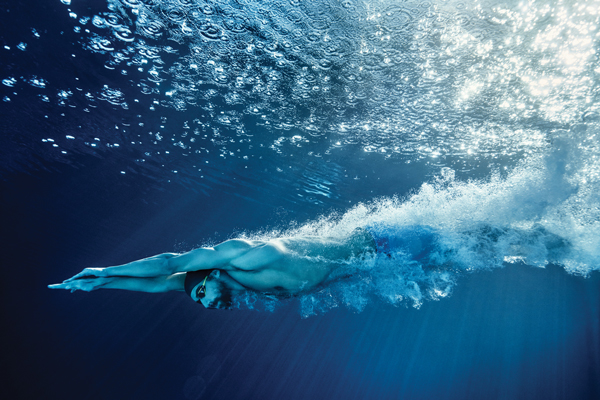 |
Under Armour released an ad with Michael Phelps in accordance with the new rules.
Photo by: UNDER ARMOUT
|
The next two weeks set up to be a high-stakes testing period for the new Olympic sponsorship paradigm that relaxes the outright ban on athletes appearing in nonsponsor advertising during the Games.
Before March 27, official Olympic sponsors — who paid for absolute exclusivity — finally get to see what the U.S. Olympic Committee has permitted under a strict waiver process for nonofficial sponsors.
In implementing changes to the International Olympic Committee’s Rule 40, the USOC has to walk a fine line: relax the ban enough to give nonsponsors an incentive to sign athletes whose value peaks during an Olympics, while still giving official partners the exclusive affiliation with the Games.
All this is playing out as the USOC works to renew 17 sponsor contracts that expire this year.
The solution has been a labor-intensive review of the proposed creative components of a nonsponsor campaign, with the USOC only allowing spots to air during the Rio Games’ marketing blackout period that steer clear of Olympic imagery and terms, launch by March 27 and stay in the market until the end of the Rio Games in August.
The USOC promised strict confidentiality to prevent competitors from seeing each other’s work. But with only two weeks left until the mandatory launch date, official sponsors are carefully watching, a source at one major sponsor said. They’re withholding judgment for now but will be extremely unhappy with the USOC if they believe the ads amount to a sanctioned ambush, the source said.
Earlier this month, Under Armour released two ads in accordance with the new rules, one featuring swimmer Michael Phelps and another featuring three members of the U.S. women’s gymnastics team. (Both Phelps and USA Gymnastics have separate deals with the apparel maker, but those do not grant Olympic marketing rights.)
Under Armour intends to air the ads during the Rio Games if the USOC grants a waiver. If not, the company will pull the spots prior to the Olympics’ marketing blackout period that runs from July 27 through Aug. 24.
The company’s chief competitor and USOC sponsor Nike did not respond to a request for comment.
Neither commercial refers to the Olympics. They would appear to fit the criteria for a waiver, said John Grady, a sports law professor at the University of South Carolina. But Phelps is a rare breed: an athlete so well-known that his face alone evokes the Olympics.
“It may not work as well for many lesser-known athletes but does work exceptionally well for global brands like Under Armour who can now have a stable of Olympians under Team UA, or Team Red Bull, for example,” Grady said. “The Olympic athletes that need [changes] to help them [financially] aren’t exactly the ones who will benefit the most, in my view, this summer.”
Red Bull, which doesn’t have an Olympic deal, recently posted a three-minute digital video featuring USA rugby player Carlin Isles, far less identifiable than Phelps. The video also steers clear of Olympic intellectual property. Red Bull doesn’t intend to actively share the content during the Games but successfully pursued a USOC waiver so it wouldn’t have to take the video offline during the blackout period. Coca-Cola owns worldwide rights in that category.
Athletes, of course, are in favor of any change that offers them a wider net for endorsements.
“I think it’s great they’re easing up on those rules,” said three-time Olympic swimmer Natalie Coughlin. “There are different companies that aren’t traditional Olympic sponsors now who are reaching out to us, and so it just kind of widens our reach and allows us to have deals that aren’t traditional.”
USA Swimming teammate Ryan Lochte agreed, saying the rules also help the sport reach new audiences. “For me, it just puts swimming out there more,” he said.
The USOC will not discuss specific requests, or say how many waivers have been granted. USOC Chief Marketer Lisa Baird said the committee must protect both sponsors’ and nonsponsors’ competitive interests, so sponsors truly don’t know what is coming out of the waiver system.
“When we asked these entities that we have no direct relationship with us to trust this process, I said we’d guarantee their privacy,” Baird said. “This is the first time we’re doing it, we want to do it well.”
The USOC and IOC have a reputation as aggressive protectors of their sponsors’ rights, a stance that has earned loyalty from Olympic partners. But that dynamic could change, Grady said.
“Nike will be mad, but they can be mad at the USOC and IOC for relaxing the rule, not at Under Armour for playing within the new rules,” Grady said. “The risk of alienating top sponsors was a real concern raised when the relaxed Rule 40 was first announced by the IOC.”
USOC Chief Executive Officer Scott Blackmun said he thinks most parties remain satisfied.
“I haven’t gotten a single angry call,” he said, “but we have had a lot of submissions and we’ve approved the vast majority of them.”




